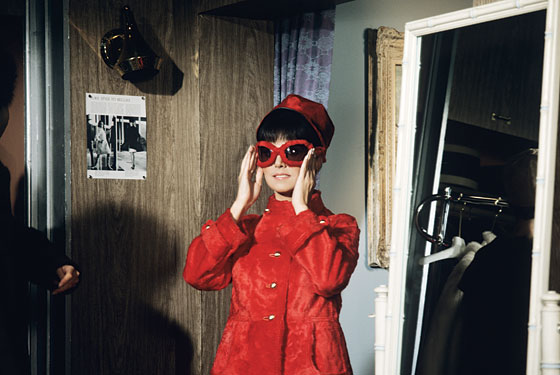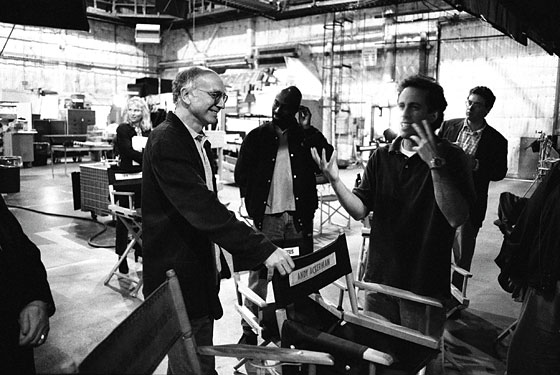
Joe Adalian: So what makes a show New Yorky anyway?
Damon Lindelof: There is a New York sense of humor that we’ve probably all experienced. People who don’t have it call it cynical …
Phil Rosenthal: Or Jew! [Laughter]
Lindelof: I’m glad you said it before I did.
Rosenthal: That’s how letters to us would begin whenever they didn’t like something: “Dear Jew.”
Lindelof: Nice. I feel like The Honeymooners had a New York sense of humor that I Love Lucy and Dick Van Dyke did not. The thing about The Honeymooners was, it could be mean!
Adam Scott: He did shitty stuff sometimes. He always figured it out and apologized, and they kissed at the end—but he was kind of a dick! And it was great!
Nina Tassler: You always got the sense that this was what life was like—apartment living, you know.
Lindelof: The window! I mean, the window was such …
Tassler: The window was everything.
Rosenthal: Looking out on other buildings.
Tassler: And Norton would walk in and out. No one knocked. You left your doors open.
Adalian: All in the Family and The Odd Couple also captured that sense of city life, no? Or at least the people living in the city.
Lindelof: The show that I liked more was All in the Family. It felt like on The Odd Couple, the conflict was always fake mean. But the conflicts on All in the Family somehow felt very, very real to me. Archie Bunker fundamentally believed his own ideas about race and his attitudes toward his son-in-law. The New York thing is the meanness, and the reality, and then pathos at the end. If you basically say, “This guy is anal-retentive, and this guy is a slob,” you could put Felix and Oscar almost anywhere and still have a comedy. But Archie had to be in New York.
Adalian: Somebody want to speak up for The Odd Couple?
Rosenthal: What I loved about Felix Ungar, aside from the brilliance of Tony Randall, is that he was another kind of New Yorker you don’t really see that much till then, which is the pseudo-intellectual. The contrast of that guy with the lowbrow Oscar made for a very good New York conflict.
Tassler: The Odd Couple felt like it was Manhattan and Archie was out in Queens. So you had …
Rosenthal: Yes! Two different New Yorks! Taxi is one of my all-time favorites, but I really believe it could have taken place in any city.
Scott: But Taxi was about the eclecticism that you find in New York. I mean, you get all kinds, and they were all thrown into a garage together. I mean, Andy Kaufman, Christopher Lloyd: These are people you see walking down the street in New York.
Adalian: We haven’t talked dramas yet, but Kojak and Baretta are certainly two quintessential New York characters.
Tassler: These guys were larger than life. They really reflected your cop as hero in New York.
Adalian: If we’re building this lexicon of adjectives, “tough” is definitely one of them.
Lindelof: And there’s a difference between tough and no-nonsense. Whereas Dragnet is just the facts, ma’am, Baretta would friggin’ punch you in the face.
Adalian: We’ve been talking prime-time, but Letterman and Saturday Night Live are pretty essential New York shows.
Rosenthal: Ed Sullivan, Late Night, SNL, the Today show. These shows at their best remind you that New York is the center of the world—where live TV started.
Lindelof: Let’s just ask a hypothetical question: What would happen if Lorne Michaels announced that he was moving SNL? To anywhere: Chicago, L.A., Vancouver. There would be such an outrage. Why? Because it’s an institution of New York. “Live from New York, it’s Saturday night.”
Rosenthal: Right over there.
Adalian: We’ve talked about the gritty New York. But there’s this fantasy version of the city, going all the way back to maybe That Girl.
Tassler: Being a young girl, watching Marlo Thomas living out her dreams and having boyfriends and a job and a career. Total and complete wish fulfillment.
Rosenthal: There’s a straight line from that to Sex and the City, right?
Tassler: [SATC] completely embraced the culture of New York. The kind of sheets you bought, where you had your hair cut—it’s in every frame of film, it’s in virtually every line of dialogue. You cannot separate New York from that show.
Lindelof: It was also the very definition of watercooler television: If I wanted to get laid when I was in my twenties, I had to watch Sex and the City.
Scott: It was an almost-voyeuristic look into the mind of the modern female, at the time.
Lindelof: It wasn’t just, “Could you believe what Carrie did or said last night?” It was “Could you believe the purse that Carrie had?” That idea of the fashion world, the Anna Wintour of it all—it can’t be Chicago. That said, I’d say that 25 percent of the marriages that happened while Sex and the City was on will end in divorce because of Sex and the City.
Adalian: Friends also fits into the young, single, free fantasy version of New York.
Rosenthal: A fantasy on every level.

Lindelof: But there’s nothing wrong with that. Where Friends does get points is with the “girl gets on a bus” idea: Somewhere in Arkansas there’s a girl, and she gets on a bus, and that bus is taking her to New York or L.A. And the L.A. dream is a prototypical “I’m going to be a star” story. But the New York dream is different. Friends is the New York dream: Where we all have umbrellas and we’re dancing around in a fountain.
Adalian: And yet …
Lindelof: Everything about that show smelled like L.A. to me. Just in terms of how beautiful they were. They might be sitting in a place called Central Perk, but it didn’t feel like New York.
Adalian: How about a more recent New York fantasy—Gossip Girl?
Scott: My wife got me season one, and I watched it in two weeks. I thought it was terrific. It reminded me of The Age of Innocence in a lot of ways.
Lindelof: Any show that is still on the air does not make the list. Had we been having this conversation when Seinfeld and Law & Order were still on, it would have been almost impossible to understand what their legacy would be.
Adalian: So no 30 Rock? And doesn’t Mad Men have to be on this list?
Lindelof: You can’t discuss Mad Men—by definition it will win, because it wins everything. Let’s just leave it off.
Rosenthal: It’s Madison Avenue! Madison Avenue doesn’t exist anywhere else.
Adalian: Peggy’s journey, coming in from Brooklyn to Manhattan …
Lindelof: And just in the pilot of Mad Men … Is there anything more iconic than that guy walking down the street, with that hat, in that suit? And probably five years from now, when you reconvene this round-table with people much cooler than us, they will vote hands down for Mad Men.
Adalian: We have to at least discuss 30 Rock. If we didn’t have the Damon rule, and we were considering shows still on the air …
Lindelof: I absolutely love it. They actually do shoot the show in New York, and it’s called 30 Rock, so they get points for that. And there’s Baldwin, who is as Long Island as it gets. But how could 30 Rock trump SNL? 30 Rock is about the behind-the-scenes of SNL.
Adalian: So let’s just move on to shows you knew we’d end up talking about. For example, there’s no way we can dis Law & Order, is there?
Lindelof: To ignore Law & Order is just basically putting on your snooty pants and saying, “This is popcorn, and it’s not art.” But that show doesn’t care about character!
Adalian: Nina, you look ready to defend it.
Tassler: Look, I think there’s a level of authenticity that no other show really had. I mean, every single character, from the hot-dog vendor to the cabbie to the guy behind the deli counter. You’re right, character is the least important aspect of the show. But the canvas on which they’re drawing is pure, unadulterated New York.
Scott: But I’m wondering if just the fact that you’re able to transplant Law & Order to Los Angeles, take that formula and put it in another city—does that disqualify it?
Lindelof: I’ll ask you another question: Which show is more New Yorky, Hill Street Blues or Law & Order? And if you ask ten people on the street—
Tassler: They’ll say Hill Street Blues.
Lindelof: But Hill Street isn’t even set in New York! It’s not set anywhere.
Adalian: What about NYPD Blue?
Rosenthal: Spot-on. But it could have been set in any city.
Lindelof: The thing about NYPD Blue when it premiered was this idea of saying “asshole” on broadcast TV, or showing some bare ass—it was …
Rosenthal: Fantastic!
Lindelof: Amazing! And those ideas felt distinctly New York. Also, it gets bonus points for actually having “New York” in the title.
Adalian: And then there was Seinfeld.
Lindelof: There’s a fantasy New York and there’s a gritty, tough New York. And Seinfeld was able to bridge both somehow.
Rosenthal: The plot contrivances were the fantasy. But the setting and the situation and the subject matter were completely real and New York.
Tassler: Everything from the bike hanging upside down to the design of the diner. I was living in New York when it was on, and you could go to the Soup Nazi right after it was mentioned in an episode.
Rosenthal: I think the characters even defined themselves as New Yorkers by having that cynicism. Which is quintessential to the character of the city. You know, “We’ve seen it. Don’t bullshit me.”
Lindelof: The show became so meta that even now, you think about it: I’m a lifelong Yankees fan, and the first thing that I thought of when Steinbrenner died was Seinfeld.
Rosenthal: If the criteria are characters that are very much of New York; New York is on display; and everything about New York is a subject of the show: It’s gotta be Seinfeld! How could it not be? There’s no other show that’s more New York, down to the marble rye.
Scott: I just can’t get it out of my head that it was shot in L.A.
Lindelof: What it all comes down to in a lot of ways is, if you were to describe what a show is about in a single sentence, you have to use the words “New York” in that sentence.
Adalian: Yes. Seinfeld is the winner right there. That should be the definition of this game.
Lindelof: It only occurred to me while I was in the restroom.
Rosenthal: Most great ideas do.
The Arguers
Josef Adalian
Moderator
Phil Rosenthal
Creator, Everybody Loves Raymond
Nina Tassler
Head of CBS Entertainment
Adam Scott
Actor, Parks and Recreation
Damon Lindelof
Co-creator, Lost